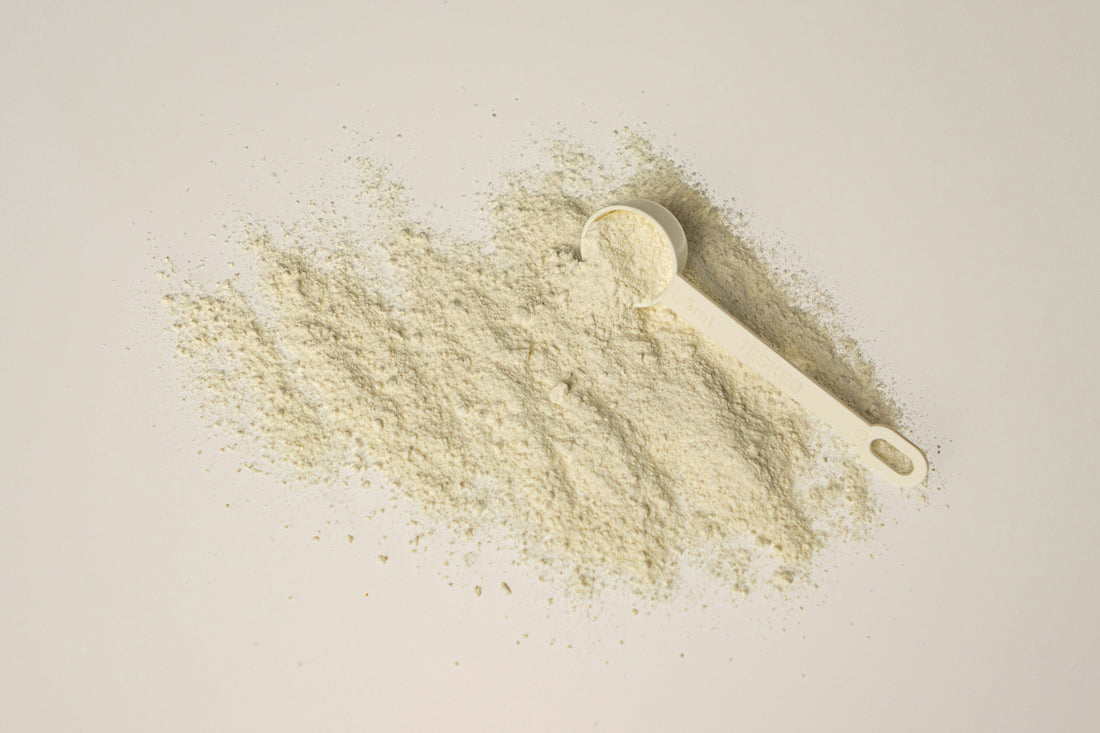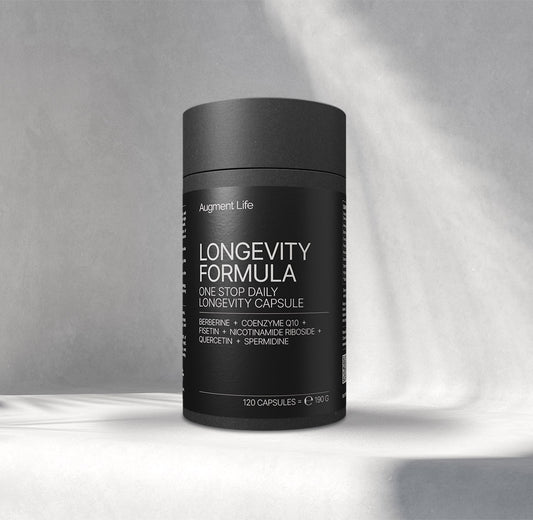Kolagen stał się obecnie jednym z najpopularniejszych suplementów diety i nie bez powodu. Odgrywa on istotną rolę w utrzymaniu młodej skóry, mocnych stawów i zdrowych kości. Wraz z wiekiem naturalna produkcja kolagenu spada, ale odpowiednie odżywianie i suplementy mogą pomóc w jego odbudowie i wsparciu.
Czytaj dalej, aby dowiedzieć się więcej o kluczowych korzyściach płynących ze stosowania kolagenu dla organizmu!
Czym jest kolagen?
Kolagen jest najbardziej rozpowszechnionym białkiem strukturalnym, co oznacza, że tworzy strukturę lub szkielet komórek i tkanek u zwierząt. Znajduje się w skórze, włosach, paznokciach, ścięgnach, chrząstkach i kościach. Wasz organizm naturalnie wytwarza kolagen, wykorzystując aminokwasy pochodzące z pokarmów bogatych w białko lub kolagen, takich jak bulion kostny, mięso i ryby.
Kolagen składa się głównie z aminokwasów glicyny, proliny i hydroksyproliny. Zapewnia wsparcie strukturalne tkankom i odgrywa ważną rolę w procesach komórkowych, w tym:
- naprawie tkanek,
- odpowiedzi immunologicznej,
- komunikacji komórkowej,
- migracji komórkowej, procesie niezbędnym do utrzymania tkanek.
Istnieje 28 zidentyfikowanych rodzajów kolagenu, przy czym typy I, II i III są najobfitsze i najczęściej występujące w organizmie człowieka.
Kolagen współpracuje z innymi substancjami, takimi jak kwas hialuronowy i elastyna, aby utrzymać elastyczność, objętość i nawilżenie skóry. Pomaga również w tworzeniu białek, takich jak keratyna, które tworzą skórę, włosy i paznokcie.
Utrata kolagenu
Fibroblasty, komórki tkanki łącznej, są odpowiedzialne za produkcję i utrzymanie kolagenu. Wraz z wiekiem kolagen ulega fragmentacji i jest rozłożony w sposób bardziej luźny, funkcja fibroblastów ulega upośledzeniu, a produkcja kolagenu spowalnia.
Zmiany te, wraz z utratą innego kluczowego białka strukturalnego zwanego elastyną, prowadzą do charakterystycznych oznak starzenia się, takich jak zmarszczki i sucha, zwiotczała skóra. Integralność kolagenu znajdującego się w układzie kostnym również zmniejsza się wraz z wiekiem, co prowadzi do zmniejszenia wytrzymałości kości.
Szkodliwe działanie promieni słonecznych, palenie tytoniu i spożywanie alkoholu zmniejszają produkcję kolagenu. Ponadto dieta bogata w dodatek cukru i wysoko przetworzoną żywność może prowadzić do przedwczesnego starzenia się, przyczyniając się do procesu zwanego glikacją, który zmniejsza obrót kolagenu i zakłóca jego zdolność do interakcji z otaczającymi komórkami i białkami.
Produkty bogate w kolagen
Bulion kostny jest jednym z najbogatszych źródeł kolagenu w pożywieniu, zwłaszcza bulion z kości wołowych i wieprzowych. Kurczak, w tym skóra, jest kolejnym produktem spożywczym, który pozwala czerpać korzyści z tego składnika odżywczego wspomagającego włosy, skórę i paznokcie.
Dowiedz się więcej o korzyściach zdrowotnych bulionu kostnego tutaj:
Możesz pomóc swojemu organizmowi w produkcji kolagenu i utrzymaniu zdrowego poziomu kolagenu oraz tkanki kostnej, po prostu włączając do swojej diety wystarczającą ilość wysokiej jakości białka, witaminy D, witamin z grupy B, witaminy A, witaminy C, wapnia i cynku.
Zbilansowana dieta z nieco większą ilością białka jest szczególnie korzystna dla utrzymania tkanki mięśniowej i zdrowia kości w miarę starzenia się. Pamiętaj, aby połączyć tę bogatą w białko dietę z aktywnością fizyczną, zwłaszcza treningiem oporowym i ćwiczeniami z obciążeniem.
Więcej informacji na temat znaczenia diety bogatej w białko i ćwiczeń fizycznych w miarę starzenia się można znaleźć w naszych poprzednich artykułach:
- Znaczenie spożywania białka – ile go potrzebujemy i dlaczego?
- Debata na temat białka – czy w starszym wieku potrzebujemy więcej białka, czy nie?
- Rola białka w utrzymaniu masy mięśniowej w miarę starzenia się
- Czy treningi HIIT i Zone 2 mają wpływ na długowieczność?
Najlepsze suplementy kolagenowe
Dobre źródła kolagenu mogą nie dostarczać takiego samego stężenia kolagenu jak suplementy doustne. Jeśli twoim celem jest poprawa zdrowia skóry lub stawów, najlepszym wyborem do twojej codziennej pielęgnacji mogą być proszki, kapsułki lub płyny.
Hydrolizowany kolagen jest popularnym rodzajem kolagenu stosowanym w suplementach, wytwarzanym w procesie zwanym hydrolizą. Proces ten rozkłada białko kolagenowe na mniejsze cząstki, znane jako hydrolizaty kolagenu, dzięki czemu łatwiej jest je wchłonąć.
Hydrolizaty kolagenu zawierają aminokwasy i peptydy o różnej długości, które mogą przeciwstawiać się hydrolizie i zapobiegać degradacji przez peptydazy i enzymy hydrolityczne. W rezultacie peptydy z hydrolizatów kolagenu mają wysoką biodostępność, dzięki czemu docierają do krwiobiegu (1).
Innymi słowy, hydrolizaty kolagenu to fragmenty kolagenu, które są wystarczająco małe i stabilne, aby przetrwać proces trawienia i rozkładu w organizmie, co pozwala na ich bardziej efektywne wykorzystanie.
Zapoznaj się z tym proszkiem kolagenowym dostępnym w Augment Life Shop:
Korzyści płynące ze stosowania suplementów kolagenowych
Przyjrzyjmy się pokrótce korzyściom, jakie może przynieść Ci stosowanie suplementów kolagenowych.
Suplementy kolagenowe dla skóry
Liczne badania naukowe wykazały korzyści płynące ze stosowania suplementów z hydrolizowanym kolagenem w poprawie oznak starzenia się skóry (2).
Przegląd 19 badań, w których wzięło udział 1125 uczestników (95% kobiet) w wieku od 20 do 70 lat, wykazał, że suplementacja hydrolizowanym kolagenem poprawiła nawilżenie skóry, jej elastyczność i zmniejszyła zmarszczki w porównaniu z leczeniem placebo (2).
Suplementy kolagenowe dla kości
Kolagen był przedmiotem wielu badań dotyczących jego roli w łagodzeniu objawów choroby zwyrodnieniowej stawów. Istnieją mocne dowody potwierdzające skuteczność i bezpieczeństwo stosowania pochodnych kolagenu w leczeniu choroby zwyrodnieniowej stawów (3).
W przeglądzie opublikowanym w 2019 roku stwierdzono, że suplementacja kolagenem spowodowała znaczne zmniejszenie sztywności (4).
Wyniki innego badania wykazały znaczną ulgę w bólu u pacjentów z chorobą zwyrodnieniową stawu kolanowego, którzy otrzymywali peptydy kolagenowe, w porównaniu z osobami, które otrzymywały placebo (5).
Jedno z badań wykazało, że spożycie określonych peptydów kolagenowych (SCP) zwiększa gęstość mineralną kości (BMD) u kobiet po menopauzie z pierwotnym, związanym z wiekiem spadkiem BMD. Ponadto suplementacja SCP wiązała się z korzystną zmianą markerów kostnych, wskazującą na zwiększone tworzenie kości i zmniejszoną degradację kości (6).
Ile kolagenu należy przyjmować?
Badania wykazały, że dorośli mogą bezpiecznie spożywać od 2,5 do 15 gramów kolagenu dziennie.
Ponieważ kolagen jest zasadniczo białkiem, nie można go przedawkować. Jednak nadmierna ilość białka może ostatecznie negatywnie wpłynąć na zdrowie nerek. Jest to jeden z powodów, dla których przed zażyciem jakiegokolwiek suplementu należy skonsultować się z lekarzem.
Kiedy najlepiej przyjmować kolagen?
Nie ma dowodów sugerujących, że przyjmowanie kolagenu o określonej porze dnia ma jakiekolwiek znaczenie. Najlepiej skupić się na regularnej, długotrwałej suplementacji, a nie na dokładnej porze dnia, w której go przyjmujesz. Jeśli przyjmowanie kolagenu wieczorem pasuje do twojej rutyny, to jest to całkowicie w porządku; jeśli nie, przyjmuj go wtedy, kiedy jest to dla ciebie najwygodniejsze.
Jak przyjmować kolagen?
Wiele osób przyjmuje 1-2 łyżki stołowe proszku kolagenowego dziennie. Proszek kolagenowy można spożywać, dodając go do koktajli, shake'ów, wypieków, zup, a nawet kawy lub herbaty. Niezależnie od tego, w jaki sposób spożywasz kolagen, kluczowa jest regularność.
Jak długo należy przyjmować kolagen?
W zależności od indywidualnych celów czas trwania i dawkowanie suplementacji kolagenem mogą się różnić.
W przypadku spożycia nadmiernej ilości kolagenu organizm albo magazynuje go w tkankach i narządach, albo pozbywa się nadmiaru, jeśli nie może go wchłonąć.
Eksperci zalecają stosowanie schematu suplementacji kolagenu w celu uzyskania optymalnych rezultatów. Typowy cykl trwa 2-3 miesiące, przy 3-4 cyklach rocznie i 1-2 miesiącach przerwy między każdym cyklem. Pozwala to organizmowi zmaksymalizować korzyści płynące z kolagenu we wszystkich narządach.
Większość rodzajów kolagenu najlepiej przyjmować w 3-4 cyklach rocznie. Jednak kolagen hydrolizowany można stosować nieprzerwanie przez lata, utrzymując długotrwałe korzyści, gdy jest przyjmowany w zalecanej dawce.
Suplementy kolagenowe – czy działają?
Czas potrzebny do zauważenia efektów działania kolagenu zależy od wieku, ponieważ proces regeneracji organizmu jest różny.
W przypadku osób w wieku 20-25 lat widoczną poprawę można zaobserwować już po trzech tygodniach, natomiast osoby w wieku 30-35 lat mogą zacząć dostrzegać rezultaty po około czterech tygodniach.
Dlatego czas potrzebny do osiągnięcia zauważalnych rezultatów suplementacji kolagenem różni się w zależności od wieku.
Kiedy odczujesz korzyści, ważne jest, aby kontynuować regularne przyjmowanie kolagenu, aby utrzymać jego długotrwałe korzyści dla urody i zdrowia.
Kto powinien unikać suplementów kolagenowych?
Przed rozpoczęciem stosowania jakiegokolwiek nowego suplementu ważne jest, aby skonsultować się z lekarzem, zwłaszcza jeśli cierpisz na schorzenia podstawowe.
Osoby z podagrą lub innymi schorzeniami wymagającymi ograniczenia spożycia białka powinny unikać suplementów kolagenowych, ponieważ produkty te mogą pogorszyć objawy lub kolidować z zaleceniami dietetycznymi.
Osoby z chorobami nerek lub wątroby, które wpływają na metabolizm białek, również powinny zachować ostrożność, ponieważ zwiększone spożycie białka z kolagenu może dodatkowo obciążać te narządy.
Jeśli jesteś w ciąży lub karmisz piersią, najlepiej na razie odłożyć suplementację kolagenem. Obecne badania dotyczące bezpieczeństwa stosowania kolagenu w czasie ciąży i karmienia piersią są ograniczone i potrzebne są dalsze badania, aby wyciągnąć ostateczne wnioski.
Źródła:
- Liang CW, Cheng HY, Lee YH, Liao CD, Huang SW. Efficacy and safety of collagen derivatives for osteoarthritis: A trial sequential meta-analysis. Osteoarthritis Cartilage. 2024 May;32(5):574–584. doi: 10.1016/j.joca.2023.12.010.
- de Miranda RB, Weimer P, Rossi RC. Effects of hydrolyzed collagen supplementation on skin aging: a systematic review and meta-analysis. Int J Dermatol. 2021 Dec;60(12):1449-1461. doi: 10.1111/ijd.15518. PMID: 33742704
- Liang CW, Cheng HY, Lee YH, Liao CD, Huang SW. Efficacy and safety of collagen derivatives for osteoarthritis: a trial sequential meta-analysis. Osteoarthritis Cartilage. 2024 May;32(5):574–584. doi:10.1016/j.joca.2023.12.010.
- García-Coronado JM, Martínez-Olvera L, Elizondo-Omaña RE, Acosta-Olivo CA, Vilchez-Cavazos F, Simental-Mendía LE, Simental-Mendía M. Effect of collagen supplementation on osteoarthritis symptoms: a meta-analysis of randomized placebo-controlled trials. Int Orthop. 2019 Mar;43(3):531–8. doi:10.1007/s00264-018-4211-5.
- Lin CR, Tsai SHL, Huang KY, Lee CW, Lin YC, Chien TW. Analgesic efficacy of collagen peptide in knee osteoarthritis: a meta-analysis of randomized controlled trials. J Orthop Surg Res. 2023;18:694. doi:10.1186/s13018-023-04182-w.
- König D, Oesser S, Scharla S, Zdzieblik D, Gollhofer A. Specific collagen peptides improve bone mineral density and bone markers in postmenopausal women: a randomized controlled study. Nutrients. 2018 Jan 16;10(1):97. doi:10.3390/nu10010097. PMID: 29337906; PMCID: PMC5793325.











